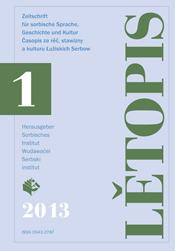Neue Erkenntnisse über Andreas Tharaeus Muscoviensis
New discoveries about Andreas Tharaeus Muscoviensis
Author(s): Doris TeichmannSubject(s): History
Published by: Domowina-Verlag GmbH / Ludowe nakładnistwo Domowina
Keywords: Handroš Tara; Andreas Tharaeus; Biography; Biographie; 17. Jahrhundert; 17th century; Lower Lusatia
Summary/Abstract: The life of Andreas Tharaeus Muscoviensis, author of the didactic poem, which appeared in 1609 “Eine erbermliche Klage der lieben Fraw Gerste vnd ihres Brudern Herrn Flachs” (A pitiful complaint from the dear Mrs Gerste and her brother, Mr Flachs), of the “Enchiridion Vandalicum” from the year 1610 and of the comedy “Weiber Spiegel” (Wives’ Mirrors), is largely unknown. A document printed in 1618 in Wittenberg extends our knowledge about the Sorbian priest and writer, who came from Muskau. The extensive funeral address written by Tharaeus for the burial of Eva von Schönburg, wife of Albrecht Schenck von Landsberg auf Leuthen, Buchholz, Teupitz und Wusterhausen, on the 22 October 1617 in Groß-Leuthen near Lübben shows that Tharaeus had already become the priest of Märkisch Buchholz by around 1617, and not later in 1628. In the document of 1689, issued to his heirs about the privileges of the freehold property acquired in 1627 in Buchholz the services rendered by the testator to the aristocratic family Schenck von Landsberg were expressly emphasised. From this it can be concluded that Tharaeus was for a period after leaving his post at Friedersdorf for denominational reasons not in the service of the Church. This analysis of the extensive funeral address shows that its author was an exceptionally well-educated and well-read Sorbian priest.
- Issue Year: 2013
- Issue No: 1
- Page Range: 74-105
- Page Count: 32
- Language: German
- Content File-PDF

